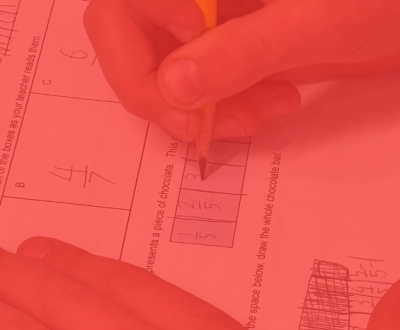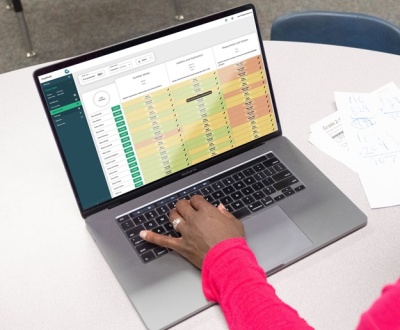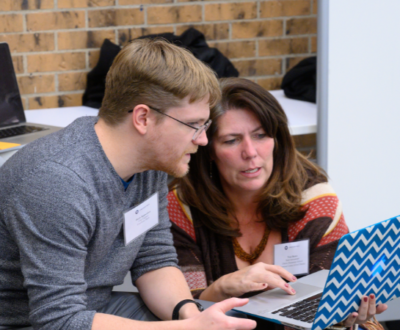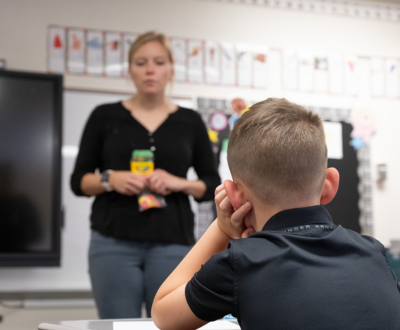Three Key Questions at the Start of Second Grade
- May 9, 2024
- Blog

Identifying Students at Risk for Math Difficulties
Mathematical proficiency is built on a strong foundation of number sense, and early math screening can help identify students who struggle with these fundamental concepts. Research has shown that just three carefully selected questions from the fall second-grade Universal Screeners for Number Sense (USNS) can reliably identify students who are highly likely to experience persistent math difficulties throughout elementary school.
These questions assess essential number sense skills—specifically, forward number word sequences and early addition strategies. The ability to count forward fluently and to use counting as a strategy for solving addition problems serves as a key predictor of future mathematical achievement. If a student struggles with these tasks at the start of second grade, it signals a strong need for additional support and early intervention.
The Three Screening Questions
The following three questions, administered as part of the fall, second-grade USNS assessments, have been demonstrated to effectively identify students at high risk for future math struggles:
-
- Counting Forward from 27 (Question 1)
Ask the student: “Start counting from 27, and I will tell you when to stop.” (Stop at 43). If the student makes an error, allow them a second attempt. - Counting Forward from 96 (Question 2)
Ask the student: “Start counting from 96, and I will tell you when to stop.” (Stop at 120). Again, if an error is made, give the student another chance to count correctly. - Addition Without Visual Aids (Question 5)
Show the student 9 blue counters and then cover them with a piece of paper. Next, show them 6 red counters and cover them with a second piece of paper. Then ask: “How many counters are there all together?” If the student struggles to answer correctly, repeat the task while ensuring they understand. If their problem-solving strategy is unclear, follow up with: “How did you figure that out?”
- Counting Forward from 27 (Question 1)
These three simple but powerful questions measure core number sense skills: the ability to count forward fluently (questions 1 and 2) and the ability to use counting as a strategy to solve an addition problem (question 3). If a student is unable to perform these tasks at the start of second grade, it serves as a clear warning sign that they will likely struggle with mathematics without additional instructional support.
The Research Behind the USNS Findings
A comprehensive study involving more than 5,700 students found that children who had difficulty mastering forward number word sequences and who had not yet developed the ability to use counting strategies to solve basic addition problems. They were highly unlikely to reach proficiency on state math assessments in third, fourth, and fifth grades (Wilkins, Woodward, & Norton).
These findings reinforce the importance of early screening and intervention. By identifying students who struggle with these foundational skills as early as second grade, educators can take proactive steps to support their development and improve their long-term mathematical outcomes.
Understanding the “Pre-numerical” Category
The research also categorized students into different levels based on their early number sense skills. A particularly critical group, referred to as “pre-numerical” students, demonstrated the following difficulties in the fall of second grade:
-
- Inability to recite forward number sequences to 100
- Inability to mentally add 9 + 6
Students in this category were significantly more likely to experience persistent math struggles throughout elementary school. Their difficulty with basic number sense concepts indicated an urgent need for targeted intervention to build the foundational skills necessary for future success in mathematics.
Using USNS Results for Targeted Interventions
The Universal Screeners for Number Sense were specifically designed to assess the skills and concepts that decades of research have identified as key indicators of early mathematical cognition. Unlike many other early math assessments, which often focus on a broad range of skills without pinpointing critical areas of need, the USNS provides highly focused data that can be directly applied to classroom instruction and intervention efforts.
How Schools Can Use USNS Data Effectively
Early Math Screening to Identify At-Risk Students
By administering the USNS at the start of second grade, schools can quickly determine which students require additional support before they begin to fall behind. This allows educators to take proactive, preventative measures rather than waiting until students fail state assessments in later grades.
Targeted Instructional Strategies
Because the USNS pinpoints specific areas of difficulty—such as counting fluency and addition strategies—teachers can tailor their instruction to directly address these weaknesses. For example, students who struggle with forward number word sequences may benefit from daily oral counting exercises and hands-on number line activities.
Better Resource Allocation
School districts frequently struggle with deciding how to allocate intervention resources effectively. The USNS provides clear, data-driven insights into where support is most needed, ensuring that resources are directed toward students who require the most assistance.
More Effective Collaboration Between Teachers and Specialists
When specialists such as math interventionists, special education teachers, and instructional coaches have access to specific, detailed screening data, they can collaborate more effectively with classroom teachers to develop targeted intervention plans.
Early Math Screening Challenges
Many schools implement math screenings, but few assessments focus on the most critical aspects of early numeracy. Even when early screening is in place, the information provided is often too broad or lacking in actionable insights for teachers to make meaningful instructional changes.
Common issues with early math screening include:
-
- Screeners that assess too many unrelated skills, making it difficult to determine which foundational gaps need to be addressed.
- Lack of specificity in results, leaving teachers uncertain about how to adjust their instruction.
- Assessments that do not provide clear next steps for intervention, resulting in a lack of follow-through after students are identified as at risk.
The Universal Screeners for Number Sense are designed to overcome these challenges. They focus exclusively on key number sense indicators, ensuring that teachers receive precise, actionable data that can drive effective interventions.
Why the Universal Screeners for Number Sense Stand Out
Several features make the USNS unique compared to other early numeracy assessments:
-
- Highly Predictive Indicators: The USNS targets number sense skills that have been scientifically linked to future math success.
- Child-Centered and Asset-Based Approach: Instead of focusing on deficits, the screeners highlight students’ strengths and areas for growth.
- Designed with Universal Design for Learning (UDL) Principles: The assessments are accessible to all students, including those with diverse learning needs.
- Direct Connection to Instructional Strategies: Teachers receive clear guidance on how to use screening data to inform classroom instruction.
Perhaps most importantly, the USNS does not simply identify students at risk—it provides a clear roadmap for how schools can intervene effectively. By leveraging these screeners, educators can ensure that students receive the support they require before math difficulties become entrenched.
Download the USNS Assessments
Early intervention is key to preventing long-term math difficulties. The Universal Screeners for Number Sense offer an effective, research-based approach to identifying and supporting at-risk students in second grade. Download your free copy of the USNS assessments today.
Citations
Wilkins, J. L., Woodward, D., & Norton, A. (2020). Children's number sequences as predictors of later mathematical development. Mathematics Education Research Journal. https://doi.org/10.1007/s13394-020-00317-y
About us and this blog
Our team and tools help schools implement standards-based grading, streamline assessment systems, and use meaningful data to drive decision-making.
Free K-6 Math Screener
The Universal Screeners for Number Sense (USNS) assessments are interview-based and pencil and paper K-6 math screeners designed by teachers to assess for students' number sense. This open-source project provides free, high-quality assessment tools to over 9,000 schools in the US and internationally. Learn more and access your free copy below.
More from our blog
See all postsForefront is the only assessment data solution optimized for classroom assessment results, leveraging these results to fuel instruction, PLCs, and grading. Elevate meaningful assessment data district-wide to transform how you understand and communicate about student learning across your schools.
Copyright © 2025 Forefront Education, Inc. All Rights Reserved.







